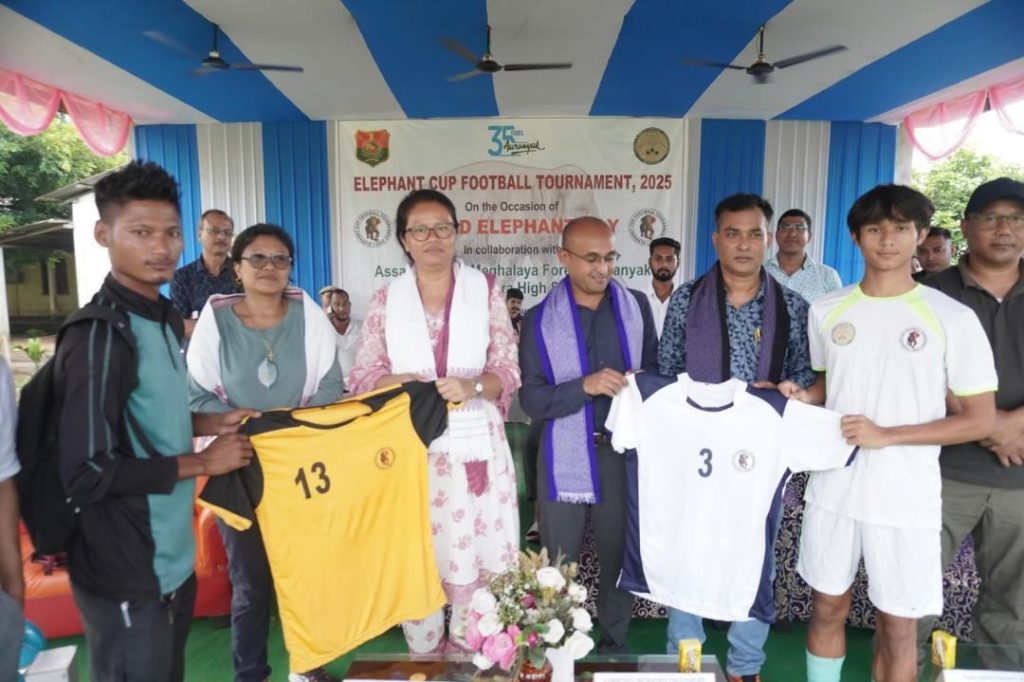
Elephant Cup unites Assam-Meghalaya in conflict awareness
The Elephant Cup football tournament, an annual event that brings together forest officials, conservation organizations, and local communities from Assam and Meghalaya, has successfully promoted cross-border cooperation to tackle the rising issue of human-elephant conflict along their shared boundary. The third edition of the tournament, held at Barjhora, Goalpara, Assam, saw a gathering of enthusiastic participants from both states, all united in their quest to address the pressing problem of human-elephant conflict.
Human-elephant conflict is a growing concern in the region, with increasing numbers of elephants venturing into human-dominated landscapes in search of food and shelter, leading to frequent clashes between humans and elephants. The situation is exacerbated by the fact that elephants do not recognize borders, and their movements are often disrupted by human settlements, infrastructure, and agriculture projects.
The Elephant Cup tournament, organized by Aaranyak, a leading non-profit organization working towards wildlife conservation in Assam, aims to raise awareness about human-elephant conflict and promote joint efforts to mitigate its effects. The event has gained popularity over the years, attracting participation from local communities, forest officials, and conservation experts from both Assam and Meghalaya.
This year’s tournament was attended by over 100 participants, including forest officials, conservation experts, and local community members from both states. The event featured a series of matches played between teams from Assam and Meghalaya, with the winning team receiving a trophy and a cash prize. However, the real prize was the opportunity for the participants to come together, share their experiences, and learn from each other’s strategies for managing human-elephant conflict.
“The Elephant Cup tournament is an excellent platform for us to come together and discuss the issues related to human-elephant conflict,” said Dr. Nilotpal Basistha, a conservation expert from Aaranyak. “By sharing our experiences and expertise, we can develop effective strategies for mitigating the conflict and ensuring the coexistence of humans and elephants.”
The tournament also featured a series of workshops and seminars, where participants discussed topics such as elephant behavior, habitat fragmentation, and conflict mitigation strategies. The event was also attended by local community members, who shared their stories of human-elephant conflict and emphasized the need for joint efforts to address the issue.
“We have been facing problems with elephants for a long time, and we need the support of both states to address this issue,” said Kripa Shankar Singh, a local resident from Meghalaya. “The Elephant Cup tournament has brought us together, and we hope that it will continue to promote cooperation between our states to protect both humans and elephants.”
The Elephant Cup tournament has also received support from local authorities, with officials from both Assam and Meghalaya attending the event. “The Elephant Cup is an excellent initiative that promotes cross-border cooperation and highlights the need for joint efforts to address human-elephant conflict,” said N. C. Goyal, a senior forest official from Assam.
The success of the Elephant Cup tournament has paved the way for future initiatives that promote cooperation between Assam and Meghalaya to address human-elephant conflict. The event has demonstrated that by working together, local communities, forest officials, and conservation experts can develop effective strategies for mitigating the conflict and ensuring the coexistence of humans and elephants.
In conclusion, the Elephant Cup football tournament has successfully united Assam and Meghalaya in their fight against human-elephant conflict. The event has promoted cross-border cooperation, raised awareness about the issue, and highlighted the need for joint efforts to address the problem. As the tournament continues to grow in popularity, it is likely to play a vital role in promoting cooperation between the two states and ensuring the long-term coexistence of humans and elephants.






